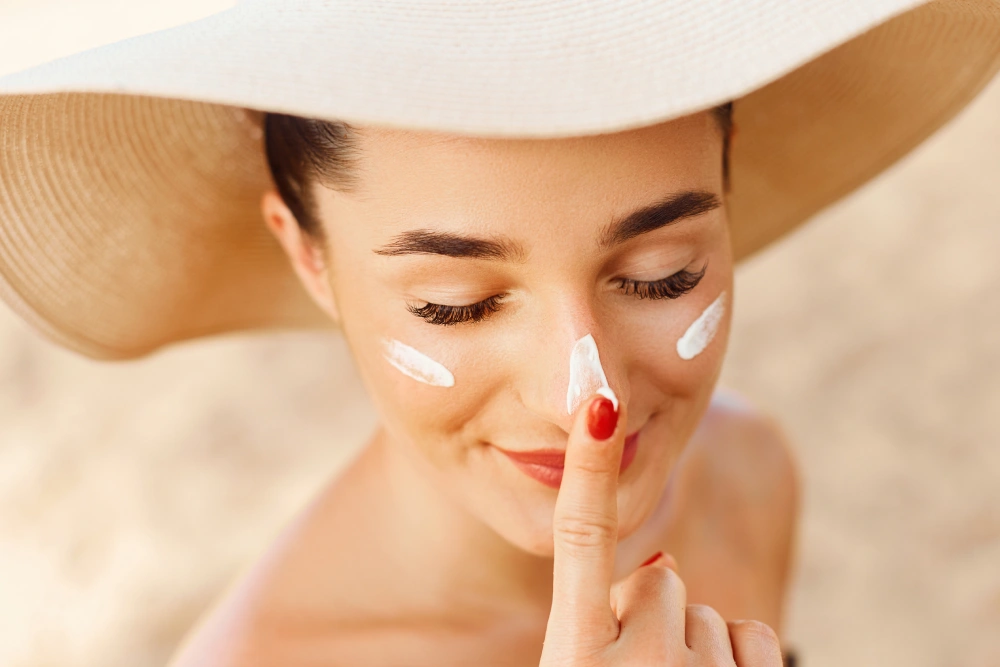I know it’s hard to believe, but summer really is just around the corner. (If you were in the Mount Pocono area yesterday, you’re probably laughing pretty loud since it snowed yesterday afternoon.) But summer will be arriving in a few weeks, so now is the time to get ready for all the sun exposure that’s coming your way. I’m not saying you shouldn’t have been wearing sunscreen during the winter, and I’m hoping you were, but just in case you weren’t let’s get in the sunscreen mindset now. Do you know how to choose the right sunscreen? And how about what SPF (sun protection factor) you should be using? Well, I’m here to help, and so is Marina Buckley, M.D. of MilfordMD Cosmetic Dermatology Surgery & Laser Center.
First things first – get rid of the old sunscreen in the house. I don’t mean the stuff you bought last year while on vacation. But anything that’s super old should be tossed. The Skin Cancer Foundation states that there is no reason to throw away last year’s sunscreen, but you should be aware that the shelf life of most sunscreens are two to three years. When in doubt, throw it out. Make sure when choosing sunscreen that you choose one with zinc oxide or titanium. Dermatologists, including Dr. Marina Buckley of MilfordMD in Northeastern Pennsylvania, recommend using a sunscreen with at least an SPF of 30. Here’s a question for you – do you know what SPF really means? SPF is a measure of a sunscreen’s ability to prevent UVB rays from damaging the skin. Choosing a broad spectrum sunscreen is best since that protects the skin from both UVA and UVB rays. You should apply sunscreen 30 minutes before venturing outdoors, and reapply every two hours (or sooner if you are in the water or sweating a lot).
Well now that I told you all that, I guess it’s time to let you in on some new sunscreen news. The FDA revised the sunscreen guidelines in 2012 and there will be new labeling revisions in 2013. But here’s the catch – sunscreens made before December 2012 may not reflect the new labeling requirements, so it can get a little confusing when sunscreen shopping. Here’s the lowdown on the new labeling standards, according to EmpowHER Women’s Health Online –
– Broad Spectrum – Any sunscreen that is labeled “broad spectrum” means it protects against both UVA and UVB rays. The proposed regulation states that the labeling should not be allowed to claim an SPF above 50. The highest rating will now be SPF 50+. (It’s important to note that according to the Skin Cancer Foundation, SPF 15 filters out 93 percent of UVB rays, SPF 30 filters out 97 percent and SPF 50 filters 98 percent.
– Only products that are broad spectrum and SPF 15 or above may state, “If used as directed with other sun protection measures, this product reduces the risk of skin cancer and early skin aging, as well as helps prevent sunburn.” In the past, sunscreen manufacturers have not been allowed to make such a claim.
– Sunscreens can no longer claim to be sweat proof or waterproof, and sunscreen cannot claim to be a sunblock.
– Sunscreens that claim to be water-resistant will only have two reapply options listed – 40 minutes or 80 minutes. If a sunscreen is not water-resistant, the label must instruct consumers to use one that is when swimming or sweating.
– There are 17 active ingredients approved for sunscreen protection by the FDA. There may also be other ingredients though. Labels must list all ingredients.
With Memorial Day right around the corner, you know you’ll be soon sitting outside BBQ’ing with friends and playing with the kids at the park. And eventually, you’ll even be taking a dip in the pool. (I promise, winter is gone for a while.) Here are a few other summer skin tips to protect yourself and your family while enjoying the outdoors –
– Exfoliate often
– Wear a hat and sunglasses
– Stay well hydrated (with water!!)
– I know you’ll be wearing sunscreen, so I won’t remind you of that again
– Don’t forget to use some lip protection
– Try to avoid the sun between 10 a.m. and 2 p.m. if at all possible
– Did I mention sunscreen with SPF 30+?????
Maybe all this sunscreen talk is new to you. Even if that’s not the case, it’s always a good idea to have a skin evaluation to check for any suspicious moles. Early detection is key. Call MilfordMD to schedule your skin evaluation with Dr. Marina Buckley at 570-296-4000, and be sure to visit www.milfordmd.com for more helpful tips and information.



